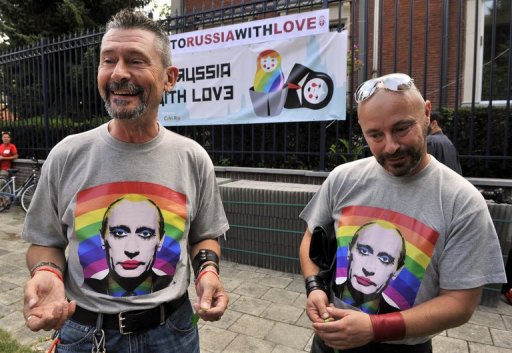Maria and Alexandra vaguely considered leaving Russia for several years, but it was not until this year’s anti-gay legislation that they started to gather paperwork.
The quiet, academic lesbian couple, who live with a seven-year-old daughter in the outskirts of Moscow, have now lost hope that Russia is moving in the direction of Europe, where same-sex marriages are increasingly legalised despite opposition from conservatives.
Earlier this year President Vladimir Putin signed a law banning the dissemination of “gay propaganda” to minors, which has already prompted an international outcry and even calls for Russia to be stripped of its right to host the Winter Olympics.
In practice, the law means that anyone in Russia can be fined for telling children that homosexual and heterosexual relationships are equal. This “really speeded us up” in wanting to leave the country, Maria said.
Everyone interviewed by AFP for this article requested that only first names are used, and some asked that even the first names are changed, in order to keep their identity secret.
The women have started an application process for residency in Canada, where Alexandra, a research scientist, qualifies as a young professional and can bring the whole family of three over under the country’s conditions for same-sex couples.
The gay propaganda law is just the beginning, they said, pointing out recent remarks by lawmaker Yelena Mizulina that the state should have the right to take children out of homosexual families.
Mizulina has said the family committee she is chairing in the Duma lower house is writing a new family policy based on “traditional” values like registered heterosexual marriage and refusal of abortions.
Last month, Russia’s influential Orthodox Patriarch Kirill called the increasing legalisation of same-sex marriage in other countries a “syndrome of apocalypse” which Russia must fight.
Militantly conservative rhetoric has come amid increasing intolerance. Since 2005, the number of people who believe gays should have equal rights as the rest of society fell from 51 to 39 percent this year.
The number of people who believe that homosexuality is an illness or is caused by “licentiousness” also grew from 67 to 78 percent in that period, according to Levada centre pollster.
Violent crimes committed against gays are rarely investigated, according to Moscow-based lawyer Ilnur Sharapov who had represented people injured at gay protests by neo-Nazi or ultraconservative Orthodox activists.
In the increasingly homophobic environment, gay parents now worry what will happen if their child is asked about their home situation in school.
Single mothers, or two women living together with a child are a familiar picture in Russia.
But in a country where men almost never get custody in a divorce, gay men have to be more circumspect, said Artyom, 30, who recently became a biological father to twins and is helping a lesbian couple raise them.
He and the babies’ mother married when she was pregnant, and their parents happily help out in full ignorance that his wife is in a long-term relationship with a woman. He spends time daily with the children, feeding, changing, and taking them for walks.
Artyom’s view that gays should keep quiet about who they are is very widespread. The gay propaganda law was protested only by a handful of people.

COMMENTS
Please let us know if you're having issues with commenting.